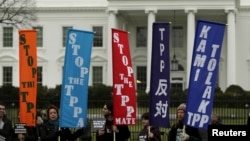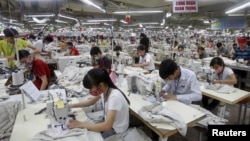U.S. President Barack Obama says he is optimistic that Congress will eventually approve the 12-nation Pacific Rim trade deal even though both 2016 presidential candidates, Democrat Hillary Clinton and Republican Donald Trump, oppose it.
Obama, who leaves office next January, offered his prediction Monday in an interview with The Straits Times ahead of Singapore Prime Minister Lee Hsien Loong's state visit to Washington, culminating in a White House state dinner Tuesday night.
But Obama acknowledged that congressional approval of the sweeping pact will be difficult in the U.S., where many workers have suffered as employers move operations overseas or take advantage of technological advances in manufacturing to increase production while cutting their workforces.
"The politics around trade can be very difficult — especially in an election year," Obama said. "There are legitimate concerns and anxieties that the forces of globalization are leaving too many people behind — and we have to take those concerns seriously and address them."
"But the answer isn't to turn inward and embrace protectionism," Obama said. "We can't just walk away from trade. In a global economy where our economies and supply chains are deeply integrated, it's not even possible."
The American leader said he remains committed to the Trans-Pacific Trade Partnership "because it's a good deal — for America, for the region and for the world. TPP advances America's economic and our strategic interests. It would eliminate 18,000 tariffs — basically taxes — on American products and help us sell more American exports to the Asia Pacific."
"It will help strengthen our relationships with partners like Singapore and lay the foundation for even greater cooperation in other areas," Obama said. "It will make sure that we're writing the rules for trade in the 21st century."
Clinton, as Obama's first-term secretary of state from 2009 to 2013, was a staunch TPP advocate, saying it "sets the gold standard in trade agreements."
But last year, in the months-long campaign for the Democratic presidential nomination, she said the details in the agreement did not meet her standards and turned against it. Clinton said it did not clamp down on currency manipulation and lacked patent protection provisions for drug companies in poorer countries.
Clinton said she wants "more new, good jobs for Americans, for raising wages for Americans. And I want to make sure that I can look into the eyes of any middle-class American and say, 'This will help raise your wages.' And I concluded I could not."
Trump has built his support among blue-collar workers by opposing trade deals, the pending Pacific deal, as well as the 1994 North American Free Trade Agreement with Mexico and Canada enacted when Clinton's husband, former President Bill Clinton, was in the White House.





